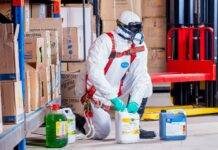
COSHH Standards
COSHH Standards : COSHH, an acronym for Control of Substances Hazardous to Health, stands as a pivotal set of regulations governing the handling, usage, and storage of hazardous substances within various workplaces. Understanding its intricacies is vital for ensuring a safe and healthy working environment for employees across industries.
Understanding COSHH: What Does it Entail?
COSHH essentially revolves around the meticulous management of substances that could pose health risks to individuals in a work setting. It involves comprehensive strategies and protocols aimed at safeguarding the well-being of employees while they handle potentially harmful materials.
The key components of COSHH standards include:
Hazard Identification
The initial step involves recognizing and cataloging potential hazards present in the workplace. This encompasses identifying chemicals, biological agents, dusts, fumes, or any other substances that could pose risks to human health.
Risk Assessment
Once hazards are identified, an evaluation of the risks associated with these substances is conducted. This involves analyzing the potential harm and the likelihood of exposure, aiding in determining necessary control measures.
Control Measures
Implementing control measures is crucial in mitigating risks. These measures range from substituting hazardous substances with safer alternatives, using protective equipment, implementing proper ventilation, to having stringent handling protocols.
Types of Hazardous Substances Covered by COSHH
COSHH standards apply to a wide array of hazardous materials, including chemicals, biological agents like viruses and bacteria, dusts from various sources, and harmful fumes arising from different processes.
COSHH Compliance and Responsibilities
Both employers and employees share responsibilities in adhering to COSHH standards. Employers must provide adequate training, information, and protective gear, while employees must follow guidelines and report any concerns regarding hazardous substances.
The implementation of COSHH standards varies across industries:
Implementing COSHH in Various Industries
In the healthcare sector, COSHH ensures safe handling of medical substances, while in manufacturing and construction, it regulates the usage of chemicals and dust-producing machinery.
Benefits of Adhering to COSHH Standards
Adherence to COSHH standards not only protects employee health but also minimizes potential risks in the workplace, fostering a safer and more productive environment.
Common Misconceptions About COSHH
There are misconceptions surrounding COSHH, often leading to confusion. Clearing these misunderstandings is crucial for proper compliance.
Steps to Achieve COSHH Compliance
Regular training, education, and routine inspections are essential steps in maintaining compliance with COSHH regulations.
Updating and Reviewing COSHH Standards
Regular updates and reviews of COSHH standards are necessary to adapt to evolving risks and technological advancements.
Global Implications and International COSHH Equivalents
COSHH has equivalents worldwide, indicating its global significance in ensuring workplace safety and health.
Future of COSHH Standards
As workplaces evolve and new substances emerge, the future of COSHH standards involves continuous adaptation to safeguard employee well-being.
Conclusion
COSHH standards stand as a fundamental framework for ensuring workplace safety by meticulously managing hazardous substances. Adhering to these standards not only protects employees but also fosters a healthier work environment.
Why COSHH is Essential for Workplace Safety
COSHH (Control of Substances Hazardous to Health)
FAQs About COSHH Standards
- What industries does COSHH apply to? COSHH applies to a wide range of industries, including healthcare, manufacturing, construction, laboratories, cleaning, and more. Any workplace dealing with hazardous substances needs to comply with COSHH regulations to ensure employee safety.
- Are there penalties for non-compliance with COSHH? Yes, there can be penalties for non-compliance with COSHH regulations. Depending on the severity of the breach and its impact on employee safety, penalties can include fines, legal actions, and even closure of the business in extreme cases.
- How often should COSHH assessments be conducted? COSHH assessments should be conducted regularly and whenever there are significant changes in the workplace that could affect the use of hazardous substances. It’s advisable to review assessments at least annually or more frequently if there are changes in processes or substances used.
- Can COSHH be applied outside the workplace? While COSHH primarily focuses on workplace safety, its principles and practices can be applied to household settings where hazardous substances are used, such as cleaning products, pesticides, or DIY materials. Ensuring safe handling and storage is crucial in any environment.
- Why is COSHH crucial for employee well-being? COSHH is essential for protecting employee health and preventing illnesses or injuries caused by exposure to hazardous substances. It ensures that proper precautions are taken to minimize risks, fostering a safer working environment for everyone.
























